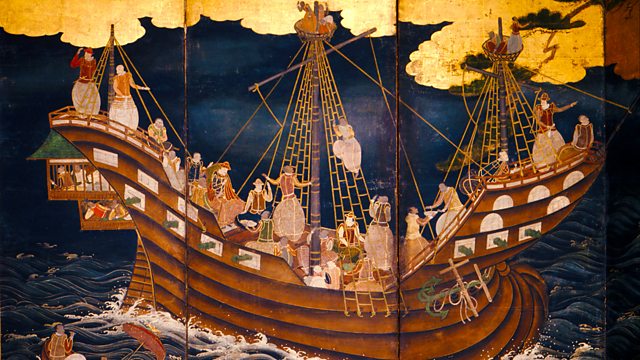Japan's Sakoku Period
Melvyn Bragg and his guests discuss Japan's Sakoku period, the years when the country chose to isolate itself from the rest of the world.
Melvyn Bragg and his guests discuss Japan's Sakoku period, two centuries when the country deliberately isolated itself from the Western world. Sakoku began with a series of edicts in the 1630s which restricted the rights of Japanese to leave their country and expelled most of the Europeans living there. For the next two hundred years, Dutch traders were the only Westerners free to live in Japan. It was not until 1858 and the gunboat diplomacy of the American Commodore Matthew Perry that Japan's international isolation finally ended. Although historians used to think of Japan as completely isolated from external influence during this period, recent scholarship suggests that Japanese society was far less isolated from European ideas during this period than previously thought.
With:
Richard Bowring
Emeritus Professor of Japanese Studies at the University of Cambridge
Andrew Cobbing
Associate Professor of History at the University of Nottingham
Rebekah Clements
Research Fellow of Queens' College and Research Associate at the Faculty of Asian and Middle Eastern Studies at the University of Cambridge.
Producer: Thomas Morris.
Last on
LINKS AND FURTHER READING
Ìý
Ìý
Ìý
Ìý
Ìý
READING LIST:
Ìý
Mary Elizabeth Berry, Japan in Print: Information and Nation in the Early Modern Period (California University Press, 2006)
Ìý
C. R. Boxer, The Christian Century in Japan, 1549-1650 (University of California Press, 1974)
Ìý
R. P. Dore, Education in Tokugawa Japan (Athlone Press, 1984)
Ìý
Robert Hellyer, Defining Engagement: Japan and Global Contexts, 1640-1868 (Harvard University Press, 2010)
Ìý
Watanabe Hiroshi (trans. David Noble), A History of Japanese Political Thought, 1600-1901 (International House of Japan, 2012)
Ìý
James Huffman, Japan in World History (Oxford University Press, 2010)
Ìý
Eiko Ikegami, The Taming of the Samurai: Honorific Individualism and the Making of Modern Japan (Harvard University Press, 1995)
Ìý
Marius B. Jansen, The Making of Modern Japan (Harvard University Press, 2000)
Ìý
Sumie Jones and Kenji Watanabe (eds.), An Edo Anthology: Literature from Japan's Mega-City (University of Hawai'i Press, 2013)
Ìý
Engelbert Kaempfer (trans. Beatrice M. Bodart-Bailey), Kaempfer’s Japan: Tokugawa Culture Observed, (University of Hawai’i Press, 1999)
Ìý
Donald Keene, The Japanese Discovery of Europe: Honda Toshiaki and other discoverers, 1720-1798 (Routledge & K. Paul, 1952)
Ìý
Michael S. Laver, The Sakoku Edicts and the Politics of Tokugawa Hegemony (Cambria Press, 2011)
Ìý
Timon Screech, The Lens Within the Heart: The Western Scientific Gaze and Popular Imagery in Later Edo Japan (Curzon, 2002)
Ìý
Haruo Shirane, Early Modern Japanese Literature: An Anthology (Columbia University Press, 2002)
Ìý
Ronald P. Toby, State and Diplomacy in Early Modern Japan: Asia in the Development of the Tokugawa Bakufu (Stanford University Press, 1991)
Ìý
John Whitney Hall (ed.), The Cambridge History of Japan, vol 4: Early Modern Japan (Cambridge University Press, 1991)
Ìý
Credits
| Role | Contributor |
|---|---|
| Presenter | Melvyn Bragg |
| Producer | Thomas Morris |
| Producer | Victoria Brignell |
Broadcasts
- Thu 4 Apr 2013 09:00Â鶹ԼÅÄ Radio 4
- Thu 4 Apr 2013 21:30Â鶹ԼÅÄ Radio 4
In Our Time podcasts
Download programmes from the huge In Our Time archive.
The In Our Time Listeners' Top 10
If you’re new to In Our Time, this is a good place to start.
Arts and Ideas podcast
Download the best of Radio 3's Free Thinking programme.
Podcast
-
![]()
In Our Time
Melvyn Bragg and guests discuss the ideas, people and events that have shaped our world.


